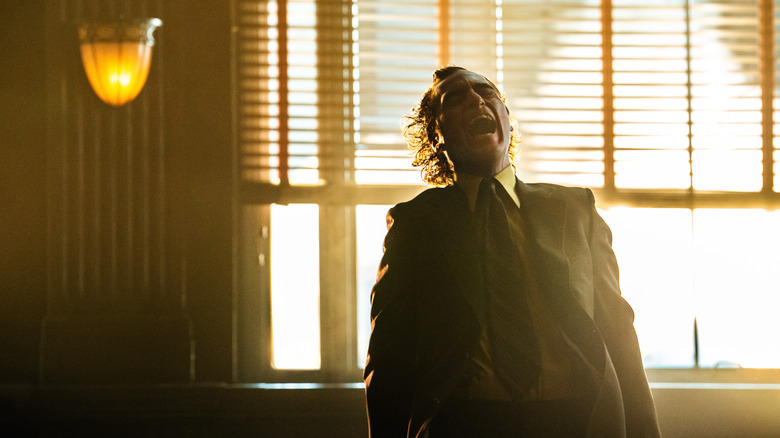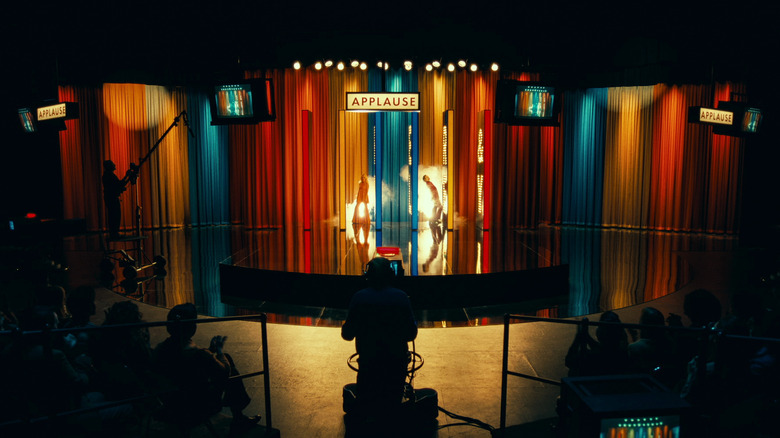One Of The Most Intriguing Elements Of Joker 2 Is Never Seen On Screen
This article contains spoilers for "Joker: Folie à Deux."
"Joker: Folie à Deux" is a frustrating movie, and in most cases that's an intentional choice. While I'd argue that such choices are the most honest, challenging, and boldest way of continuing the story of Arthur Fleck aka Joker (Joaquin Phoenix), that doesn't mean it's a wholly satisfying experience. Given the film's heavily mixed response and its uphill battle at the box office, it seems like "Folie à Deux" will be the final film in this "Joker" universe, and that's without mentioning all the narrative reasons for why a third movie will likely not be happening. As such, many of the ambiguities, unanswered questions, and unseen aspects of the two films will be forever left up to our interpretation and imagination.
One of these unseen elements concerns a piece of in-universe media that several characters mention and discuss: a TV movie that was adapted from the real-life murders which Arthur/Joker committed during the first film. We never get too much concrete information about this film, let alone see an image or a clip from it, which in and of itself is an unusual choice, as most films that introduce the idea of a movie-within-a-movie love to play around with the metafiction of that concept. Yet there are a few reasons why this "Joker" TV movie remains a mystery within "Folie à Deux," chief among them the fact that seeing any of it would betray the game that director/co-writer Todd Phillips is playing with the film and Arthur's character.
The mystery of the Joker TV movie
When Arthur first meets Lee (Lady Gaga) in Arkham State Hospital, Lee exclaims that she's obsessed with the TV movie about Joker, having seen it about 20 times. Arthur is more concerned with it being good, given that he's heard it referred to as "awful" by others. Again, it may seem like a missed trick that we don't see an image or clip from this movie to judge for ourselves. It's not like Phillips is above such flights of fancy; after all, "Folie à Deux" begins with a '40s-style Warner Bros. cartoon, and the movie itself is a jukebox musical. One reason why we may not see this movie-within-a-movie is because seeing something like that is common enough to be a cliché. For instance, most recently, the idea of a terrible movie being made out of a horrific criminal's exploits was part of the climax of HBO's "Barry" series.
There are two more reasons why we never see the Joker TV movie that feel more likely, however. One, "Folie à Deux" is primarily told from Arthur's perspective; with very few exceptions, it's an interior movie literally and figuratively, taking place almost wholly within the hospital and the courtroom where Arthur is put on trial. The opening cartoon and the musical sequences can be seen because they're part of Arthur's fantasies, his interior life. Since he's never seen the TV movie, we never see the TV movie. The second reason is a bit more obscure: throughout the film, Arthur (and we) come to learn that Lee isn't exactly a trustworthy person, discovering that she almost completely fabricates her history to Arthur upon their first meeting and potentially lies about other things along the way. It's possible that the "Joker" TV movie is not only very bad, but not as important as Arthur hopes it is.
If we were granted a parodic sequence in which we see some of this TV movie, it would burst the bubble of paranoia and ambiguity that Phillips is attempting to build around Arthur, the people in his life, and the mythos surrounding his exploits. There are numerous aspects about this Joker that we'll never be too sure about, and perhaps it's better that way. That doesn't mean we can't speculate, though, so go ahead and headcanon tha Malcolm McDowell played Arthur in this Joker TV movie. I'm sure he was great in it!
"Joker: Folie à Deux" is in theaters everywhere.

